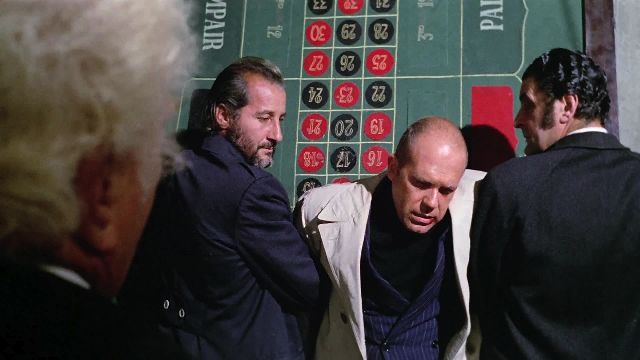Milano calibro 9 (1972) 

Milano calibro 9 (1972)
Director: Fernando Di Leo
Cast: Gastone Moschin, Barbara Bouchet, Mario Adorf
Synopsis: A newly-released prisoner finds himself suspected of engineering the theft of $300,000 from a vicious gangster.
Inspired by American crime thrillers like Bullitt and Dirty Harry, Fernando Di Leo’s Milano Calibro 9 proved to be a major influence on a generation of Italian filmmakers (and, apparently, one Q. Tarantino) and continues to be highly regarded by connoisseurs of the Polizioteschi, a genre which prospered from the declining fortunes of the Spaghetti Western in the early 1970s. It certainly emulates – and arguably surpasses – the newly-hip cynicism and violence of its American influences, while Franco Villa’s grainy photography of the Milanese cityscape atmospherically reflects the criminal underworld’s state of flux, with tired, run-down buildings jostling for space with high-rise condos.
The film’s hero, if one can describe him as such, is Ugo Piazza (Gastone Moschin – The Conformist, The Godfather Part II). He’s a throwback to the Noir heroes of the 1940s, only rougher and uglier; a solitary, taciturn chain-smoker who speaks infrequently and accepts everything – whether a gun in the face, or a naked blonde hooker sitting on his groin – with the same stoic lack of expression. The fact that it’s difficult to fathom what’s going on behind that heavy brow and perpetual scowl stands him in good stead when a loud and violent gangster called Rocco (Mario Adorf) accosts him a few streets from the prison from which he’s just been released after serving a three-year stretch for robbery.
Rocco works for The Americano (Lionel Stander – Mr Deeds Goes to Town, Once Upon a Time in the West), who suspects Piazza of orchestrating the theft of $300,000 during one of those convoluted drugs transactions which involves one stranger surreptitiously placing a package next to another stranger and then walking away, leaving the second stranger to casually pick up the package as if it had belonged to them all along. There’s a fair bit of that goes on in Milano Calibro 9, and it never ends well. One poor chap is gunned down in a bowling alley toilet cubicle after collecting such a package.
Anyway, Piazza protests his innocence, and continues to do so even though nobody believes him. Americano doesn’t believe him, but as Piazza won’t talk he decides to offer him a job – an offer he can’t refuse, if you like – to keep him close. The police commissioner determined to hustle Piazza straight back into prison doesn’t believe him, and engages in lengthy arguments with a colleague about what makes a criminal and whether they can be reformed which bring the film to a screeching halt on a couple of occasions. The cop is played by Frank Wolff, an American actor who did better in Italy than in his homeland. He’s a poor actor, who overacts outrageously, but the Italians like their bad guys to act that way in this kind of film – just look at the way no piece of scenery is safe when Adorf is delivering his lines.
Piazza negotiates a landscape filled with tripwires, with only his stripper girlfriend, Nelly (Barbara Bouchet) and a retired hitman to rely on, and at times the movie seems to be going nowhere – or, at least, in no hurry to go anywhere – as it approaches a climax that is both downbeat and inevitable. Di Leo’s direction is sober and straightforward, lapsing only occasionally into the kind of showy camera angles that other filmmakers left behind in the 60s. And although the limited budget is sometimes painfully obvious – my middle-class suburban neighbours throw more lavish garden parties than Milan’s crime kingpin – so is Di Leo’s belief in his material.
(Reviewed 18th August 2015)
httpv://www.youtube.com/watch?v=AvS-csxrKV0

